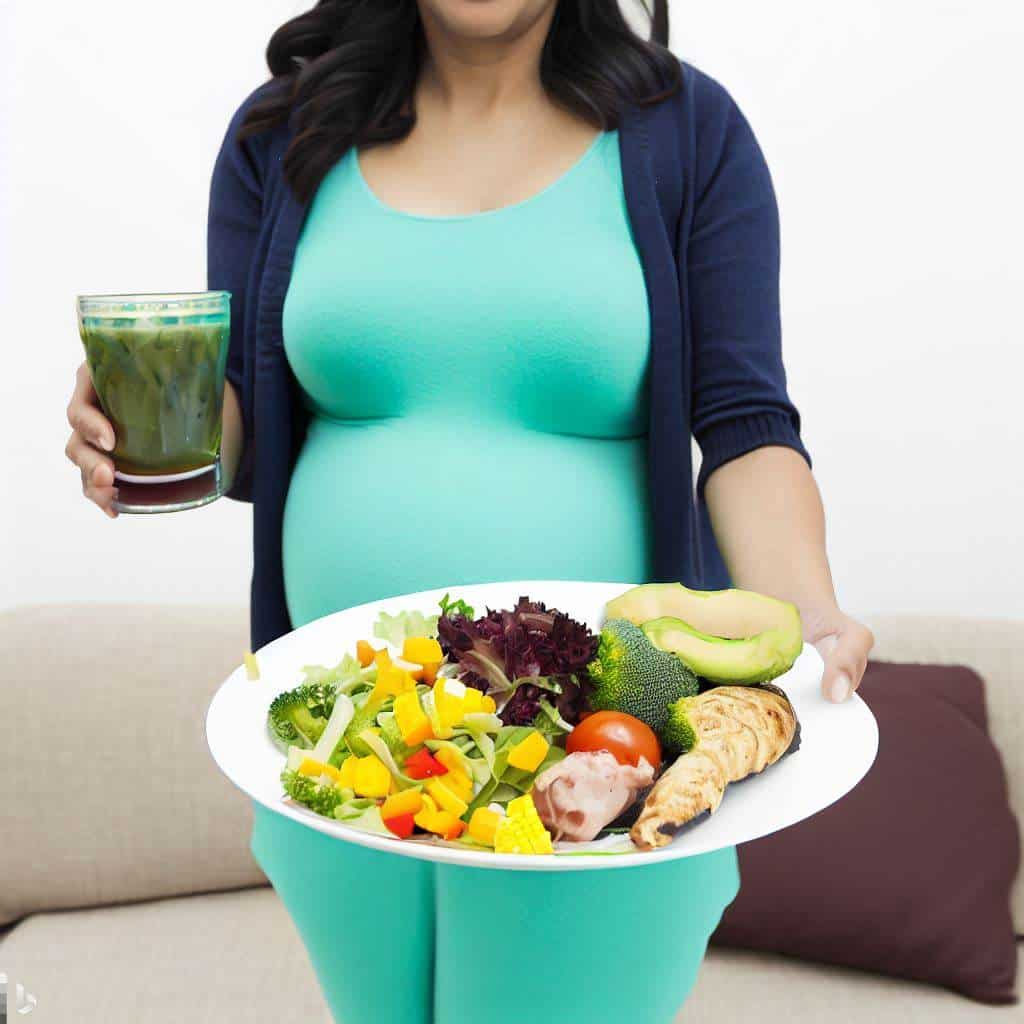It’s no secret that eating well during pregnancy is important. You want to ensure you get all the nutrients and vitamins you need to grow a healthy baby.
Eating well during pregnancy is one of the most important things an expecting mother can do to ensure the health of herself and her developing baby. The right foods provide the essential vitamins, minerals, protein, fats, and other nutrients needed for optimal growth and development. In this comprehensive guide, we will explore the benefits of proper prenatal nutrition, what to eat, what to avoid, and how to build a healthy diet during the exciting journey of pregnancy.
An Overview of Eating Well for Two

Pregnancy is a time of immense change for a woman’s body. Proper nutrition provides the fuel and building blocks to support the growth of baby and the changes taking place in mom. Here is a quick overview of why eating well matters during pregnancy:
- Supports baby’s development: Nutrition provides the vitamins, minerals, protein, fats, and calories needed for your baby to develop properly. Key nutrients support the growth of organs and tissues.
- Promotes a healthy pregnancy: The right nutrients can help prevent complications like anemia, gestational diabetes, preeclampsia, etc. Good nutrition also boosts your immunity.
- Prepares your body for labor: You need strength and endurance to carry the pregnancy and go through labor and delivery. Nutrition provides the energy for this demanding time.
- Benefits your health postpartum: Eating well can help new moms lose pregnancy weight, promote milk supply while breastfeeding, and lower the risk of postpartum depression.
Now let’s explore the specifics of what to eat and how to optimize your diet.
5 Amazing Benefits of Eating Well During Pregnancy 🤰
Eating a healthy and balanced diet during pregnancy is not only good for you, but also for your baby. Here are some of the benefits of eating well during pregnancy, along with the sources of the essential nutrients you need.
| Benefit | Nutrient | Source |
|---|---|---|
| Good fetal brain development | Folate | Leafy greens, beans, nuts, fortified cereals12 |
| Healthy birth weight | Protein | Lean meat, poultry, fish, eggs, beans, nuts123 |
| Reduced risk of birth defects | Iron | Red meat, poultry, fish, lentils, spinach, fortified cereals12 |
| Reduced pregnancy complications | Calcium | Dairy products, green leafy vegetables, tofu, almonds12 |
| Increased energy and improved sleep | Vitamin D | Oily fish, eggs, fortified cereals, sunlight12 |
Eating well during pregnancy can also help you recover faster after delivery and prepare your body for breastfeeding. Remember to eat a variety of foods from different food groups and drink plenty of water to stay hydrated. Avoid foods that are high in fat, sugar, and salt, as well as foods that may be unsafe for you or your baby. Consult your doctor or midwife if you have any questions or concerns about your diet during pregnancy. Bon appétit! 😋
Key Nutrients and Food Sources During Pregnancy

There are several vitamins and minerals that are especially important during pregnancy. Making sure you get enough of these nutrients ensures your health and meets the demands of your growing baby.
Protein
Protein is essential for building tissues, organs, hormones, antibodies, and more in your developing baby. It also preserves and builds muscle mass in mom as her body adapts to pregnancy.
- Recommended intake: 71+ grams per day during pregnancy
- Food sources: Meat, poultry, eggs, dairy, beans, lentils, nuts, seeds
Iron
Iron carries oxygen via red blood cells to your baby. It also boosts your blood volume and prevents pregnancy anemia.
- Recommended intake: 27 mg per day during pregnancy
- Food sources: Red meat, poultry, seafood, spinach, beans, lentils, fortified cereals
Calcium
Calcium is crucial for building your baby’s bones and teeth. It also helps maintain bone density in mom as the fetal needs for calcium increase.
- Recommended intake: 1000-1300 mg per day during pregnancy
- Food sources: Dairy products, leafy greens, legumes, salmon with bones, calcium-fortified foods
Folate/Folic Acid
Folate prevents neural tube defects and supports the brain and spinal cord development of babies. It also aids cell division and growth.
- Recommended intake: 600 mcg per day pre-pregnancy; 500 mcg per day during pregnancy
- Food sources: Legumes, orange juice, dark leafy greens, asparagus, fortified grains
Vitamin D
Vitamin D regulates calcium absorption and supports bone health. It also modulates immune function and cell growth.
- Recommended intake: 600 IU per day during pregnancy
- Food sources: Fatty fish, fish liver oils, fortified dairy products, egg yolks
Omega-3 Fatty Acids
Omega-3s support your baby’s brain, eye, and nervous system development. They are also linked to lower rates of preterm births.
- Recommended intake: 1.4 g per day during pregnancy
- Food sources: Fatty fish, fish oil supplements, walnuts, flax and chia seeds
Iodine
Iodine is essential for thyroid function and neurological development in babies. It also regulates metabolism.
- Recommended intake: 220 mcg per day during pregnancy
- Food sources: Seafood, dairy products, eggs, iodized salt, bread
Zinc
Zinc facilitates cell growth, immunity, and protein synthesis in your growing baby. It also helps mom adapt metabolically to her pregnant state.
- Recommended intake: 11 mg per day during pregnancy
- Food sources: Meat, shellfish, dairy products, nuts, legumes, whole grains
This covers some of the key nutrients, but it is not an exhaustive list. Eating a balanced diet with a variety of unprocessed whole foods will help provide many other vitamins and minerals. Your prenatal vitamin also helps fill any nutritional gaps.
Now let’s look at building a healthy, well-rounded pregnancy diet.
Creating a Pregnancy Diet Plan

When creating your pregnancy diet, the main focus should be on eating wholesome, nutritious foods that provide a balance of macronutrients (protein, carbs, fat) and essential micronutrients (vitamins, minerals). Here are some tips for building a well-rounded eating plan:
- Eat the rainbow: Focus on getting 2-3 servings of fruits and 3-5 servings of veggies daily in a variety of colors – this provides fiber, antioxidants, phytochemicals, and key vitamins/minerals.
- Choose lean proteins: Get 3-4 servings of protein daily from sources like poultry, fish, eggs, Greek yogurt, cottage cheese, beans, and lentils.
- **Include whole grains:**Aim for 3-4 servings of whole grains like oats, quinoa, brown rice, whole wheat bread and pasta. They provide important nutrients like B vitamins, iron, and fiber.
- Don’t skimp on healthy fats: Get 3-4 servings of unsaturated fats from sources like avocado, nuts, seeds, olive oil, and fatty fish. They help build baby’s brain and organs.
- Stay hydrated: Drink at least 10 cups of water and other fluids daily like milk or kefir. Hydration supports circulation, digestion, and nutrient absorption.
- Take a prenatal vitamin: Take your prenatal vitamin daily to supplement your diet with folic acid, iron, calcium and other key nutrients. Check with your doctor for any other supplements you may need.
- Read labels: Be an informed shopper and read food labels to choose items with less added sugar, salt, and unhealthy fats. Focus on whole, minimally processed foods.
- Control portions: Avoid overeating by paying attention to portion sizes and hunger/fullness cues – pregnant women only need about 300 extra calories daily in the second and third trimesters.
This balanced approach ensures you get enough calories, macronutrients, vitamins, minerals, fiber and fluids each day to meet your increased needs during pregnancy. Next let’s look at what foods to avoid.
Foods to Limit or Avoid During Pregnancy
While eating nutritious foods is important during pregnancy, it is also key to know what foods to avoid or limit that could be harmful for you or your developing baby. Here are some top foods and substances to restrict:
- Raw/undercooked meats and seafood: These can contain bacteria, viruses, or parasites that cause foodborne illnesses like toxoplasmosis. Cook all meats to safe internal temperatures.
- Unwashed produce: Fruits and veggies can harbor toxoplasma, E. coli, Salmonella, and Listeria. Carefully wash all produce before eating.
- Processed meats: Deli meats, hot dogs, and bacon can contain listeria. Reheat these items before eating until steaming hot.
- Unpasteurized dairy: Soft cheeses, raw milk, and unpasteurized juice may contain dangerous bacteria. Choose pasteurized options.
- Certain fish: Limit fish high in mercury like swordfish, tilefish, shark, and king mackerel that can harm baby’s developing brain and nerves.
- Raw shellfish: Clams, oysters, and mussels pose a risk of contamination with salmonella, hep A virus, and other pathogens. Cook thoroughly before eating.
- Caffeine: Limit to 200 mg caffeine per day to prevent miscarriage or fetal growth issues. Caffeine is in coffee, tea, soda, energy drinks, chocolate.
- Alcohol: Avoid completely, as alcohol travels through the placenta and can cause fetal alcohol spectrum disorders. There is no known safe amount in pregnancy.
- Tobacco: Smoking and secondhand smoke contain thousands of harmful chemicals that restrict flow of oxygen and nutrients to your developing baby. Avoid completely.
Being mindful of foods to avoid will help minimize exposure to dangerous pathogens and toxic substances during this important developmental period.
Now that we’ve covered the basics of healthy prenatal nutrition, let’s dive into some specifics.
Nutrition for Each Trimester
Your nutritional needs change throughout pregnancy as your baby develops week-by-week. Here is an overview of key dietary factors for each trimester.
First Trimester Nutrition
In the early weeks when your baby is just beginning to develop, nourishing yourself adequately is crucial. Here are some tips:
- Focus on slowly ramping up protein intake as nausea subsides – foods like Greek yogurt, nuts, nut butters, beans, eggs, and chicken are good choices.
- Stay hydrated by sipping water, ginger ale, decaf tea, broths, or sucking on ice chips to ease morning sickness.
- Choose complex carbs – whole grains give you sustained energy and help combat fatigue.
- Take a prenatal vitamin with at least 400 mcg folic acid, and extra B6 supplement if nausea is severe.
- Give into healthy food cravings in moderation – your body is telling you what it needs.
The main goal of first-trimester nutrition is to ease nausea, stay hydrated, and correct any nutritional deficiencies. Follow basic healthy eating guidelines as you’re able.
Second Trimester Nutrition
As nausea fades and your appetite improves in the second trimester, this is the time to focus on eating a balanced diet rich in the nutrients your growing baby needs. Follow these diet tips:
- Ramp up protein intake to ~75g daily to support maternal and fetal tissue growth – eggs, yogurt, beans, and salmon are good options.
- Take in at least 1000 mg of calcium daily from milk, cheese, leafy greens, and calcium-fortified foods to build baby’s bones.
- Eat iron-rich foods like red meat, spinach, and lentils to prevent anemia – your blood volume is increasing.
- Enjoy 2-4 servings of fruit and veggies daily for fiber, vitamins, minerals, and antioxidants to foster healthy fetal development.
- Drink plenty of fluids and include electrolyte drinks if you’re dealing with leg cramps.
With nausea gone, the second trimester is the perfect time to really nourish yourself and your growing baby.
Third Trimester Nutrition
During the home stretch of pregnancy, optimal nutrition helps ensure your baby finishes developing fully. Follow these diet tips:
- Continue eating high protein foods like meat, eggs, and Greek yogurt – you need extra for breastfeeding later.
- Up your calcium intake to 1300 mg daily to support your baby’s rapidly developing bones – eat plenty of dairy products and leafy greens.
- Choose complex carbs from fruits, veggies, and whole grains for sustained energy for labor and delivery.
- Drink 10-12 cups of fluids daily to stay hydrated for breastfeeding – water, milk, herbal tea, and broths are good choices.
- Satisfy food cravings and hunger as needed – you need extra calories now for milk production.
Proper third-trimester nutrition prepares you for the challenges of labor, delivery, and newborn feeding after birth.
While your diet should follow basic healthy eating guidelines throughout pregnancy, always tailor your food choices to how your body feels week-to-week and trimester-to-trimester while meeting increased nutritional needs. Next we’ll look at some specific dietary aspects.
Key Aspects of Healthy Pregnancy Nutrition
Beyond the basics we’ve already covered, there are some additional nutritional factors that contribute to an optimal pregnancy diet. Here are some of the most important considerations:
Weight Gain Goals
- Most women need 25-35 pounds of weight gain in pregnancy to nourish the baby and support changing body
- Underweight: 28-40 pounds
- Normal weight: 25-35 pounds
- Over weight: 15-25 pounds
- Higher weight: 11-20 pounds
- Gain slowly in the first trimester, about 1 pound per week in 2nd and 3rd
- Work with your doctor on appropriate goals for you
Dietary Fat
- Choose unsaturated fats like olive oil, avocado, nuts, seeds – they provide DHA for baby’s brain
- Limit saturated fat from red meat and full-fat dairy
- Avoid trans fats found in fried, processed foods
- Fat helps build baby’s organs and hormones – don’t restrict too extremely
Fiber Intake
- 25-35 grams of fiber daily helps prevent constipation and hemorrhoids
- Choose whole grains, fruits, veggies, beans, lentils, and nuts
- Stay well hydrated to ease fiber digestion
- Reduce risk of gestational diabetes by choosing healthy carbs
Vegetarian or Vegan Diets
- Can be safe in pregnancy but take a prenatal vitamin
- Eat a variety of plant proteins like beans, lentils, nuts, seeds
- Choose iron-rich foods like spinach, Swiss chard, and fortified cereal
- Include fatty fish or algae supplements for omega-3s and vitamin D
- Talk to your doctor about any other supplements needed
Food Safety
- Avoid raw meat, fish, eggs, and unpasteurized products
- Don’t eat deli meats or soft cheeses unless heated until steaming
- Cook eggs until whites and yolks are firm
- Reheat leftover foods to 165°F
- Prevent foodborne illness from toxoplasmosis, salmonella, listeriosis
Hydration
- Drink at least 80-100 oz. of liquids per day
- Water, milk, herbal tea, broths, and juices are good choices
- Limit caffeine to 200 mg daily – caffeine acts as a diuretic
- Signs of dehydration include headache, dizziness, dark urine
- Proper hydration prevents urinary tract infections, hemorrhoids, and constipation
These are just a few of many dietary considerations during pregnancy. Work with your healthcare provider to address any concerns specific to your unique needs and health status.
Overcoming Common Challenges
Pregnancy presents some unique nutritional challenges you may face. Here are some common issues and tips to overcome them:
Nausea
- Eat small, frequent meals
- Focus on bland, easy to digest foods like crackers, toast, yogurt, oatmeal
- Drink plenty of fluids – try ice chips, ginger ale, mint tea
- Take B6 and Unisom supplements to relieve symptoms
Heartburn
- Avoid spicy, acidic, and fried foods
- Eat smaller meals more frequently
- Stay upright after eating – no reclining
- Take antacids as needed for relief
Food Aversions
- Listen to your body – avoid trigger foods
- Meet nutrition needs with foods you can tolerate
- Try alternatives like smoothies or soup if whole foods unappealing
- Discuss supplements with your doctor if diet very restricted
Constipation
- Drink lots of fluids – prune juice can help
- Eat high fiber foods like fruits, veggies, whole grains, beans
- Exercise regularly – even walking helps
- Ask your doctor about using a fiber supplement
Cravings
- Give into harmless cravings in moderation
- Focus on healthy substitutions – fruit instead of candy
- Don’t restrict calories too much – it can worsen cravings
- Eat frequent small meals and snacks to prevent overindulging
Talk to your doctor if any issues like nausea or food aversions persist and threaten your ability to eat a balanced diet.
Healthy Snacks for Pregnancy
Snacks are important during pregnancy to help you meet increased calorie and nutrient needs. Here are some healthy snack ideas:
- Fresh fruits like apple slices with peanut butter
- Whole grain toast with avocado and tomato
- Yogurt with granola and berries
- Veggies and hummus
- Cottage cheese and fruit
- Oatmeal with walnuts and cinnamon
- Boiled egg and raw veggies
- Cereal with milk
- Smoothies made with milk, yogurt, and fruit
- Nut butter on whole grain crackers
- Trail mix with nuts and dried fruit
Choose snacks that include carbs, protein, and healthy fats to provide balanced nutrition and sustained energy between meals.
Sample Meal Plan for Pregnancy
To pull all of this nutrition information together, here is a sample one day meal plan for a healthy diet during pregnancy:
Breakfast: Oatmeal made with milk, berries, walnuts, and cinnamon. Orange juice on the side.
Snack: Hummus, whole grain crackers, and veggie sticks.
Lunch: Turkey and avocado sandwich on whole wheat bread. Side salad with vinaigrette.
Snack: Cottage cheese and fruit.
Dinner: Stir fry made with chicken, broccoli, peppers, onions, and teriyaki sauce over brown rice.
Dessert: Greek yogurt topped with granola and blueberries.
This provides a balance of whole grains, fruits, vegetables, lean proteins, healthy fats, and dairy needed for optimal prenatal nutrition. Tailor this based on your own nutritional needs and preferences.
Supplements for Pregnancy
In addition to a healthy diet, supplements play a key role in pregnancy:
- Prenatal vitamin: Provides folic acid, iron, calcium, and other key nutrients. Should be taken before and throughout pregnancy.
- DHA: Supports baby’s brain development. Derived from fatty fish or algae.
- Probiotics: Restore healthy gut flora. Look for lactobacillus and bifidobacterium strains.
- Iron: Prevents anemia from increased blood volume. Take only if iron-deficient.
- Calcium: Needed for fetal bone development. Take if dietary calcium intake is low.
- Vitamin D: Boosts calcium absorption and immune function. Especially important if sunlight exposure is limited.
- Magnesium: Eases constipation and muscle cramps. Take if deficient.
- Fiber: Relieves constipation. Take if the diet lacks adequate fiber.
- Herbal supplements: Discuss safety with your doctor first. Many can cause dangerous side effects.
Always talk to your healthcare provider before taking any supplements in pregnancy, including herbal products. While quality prenatal vitamins and DHA are recommended, additional supplements should be tailored to your individual needs.
Healthy Eating Postpartum
After giving birth, nutrition remains crucial during the postpartum period:
- Eat a balanced diet with extra calories and protein to meet breastfeeding needs
- Stay hydrated by drinking lots of fluids like water and herbal tea
- Take a postnatal vitamin with iron to prevent anemia
- Continuing taking omega-3s to support postpartum mood and brain development
- Nourish your body with nutrient-dense whole foods to heal and recover
- Avoid empty calories from junk food that can exacerbate post-baby blues
- Let go of rigid dietary rules to avoid feeling deprived while adjusting to motherhood
The postpartum period presents its own unique nutritional challenges. Focus on nourishing whole foods, accepting support from loved ones, and being kind to yourself.
FAQs
Why is nutrition important during pregnancy?
Proper nutrition provides the essential building blocks to support the growth and development of your baby and the changes taking place in your body.What are the most important nutrients during pregnancy?
Key nutrients include protein, iron, calcium, folate, omega-3s, choline, and vitamins A, C, D, E, B6, and B12.How much weight should I gain during pregnancy?
The recommended weight gain is 25-35 pounds for women starting at a normal weight. Discuss a goal with your doctor.What foods should I avoid during pregnancy?
Avoid raw meat/seafood, unpasteurized dairy, certain high-mercury fish, raw sprouts, alcohol, and limit caffeine.How can I overcome common challenges like nausea?
Eat small, frequent meals. Focus on bland, easy-to-digest foods. Stay hydrated with fluids and ice chips. Take B6 and Unisom.The Takeaway on Eating Well During Pregnancy
The old saying “eating for two” is absolutely true during pregnancy. Nourishing your body optimally ensures your baby gets the essential building blocks needed to develop. Follow basic healthy eating guidelines focused on whole foods, lean proteins, fruits, veggies, dairy, healthy fats, and fluids. Correct any nutritional deficiencies. Avoid harmful substances and foods prone to contamination. Meet increased calorie needs without overdoing empty calories. Stay active in addition to eating well.
Work with your doctor on a plan tailored to your health history and needs. Remember, the habits you build now can benefit your family for years to come. Pregnancy is the perfect time to embrace healthy changes. With proper nutrition, you can give your developing baby the best possible start in life while taking care of your own health as well.
References
- https://www.nhs.uk/pregnancy/keeping-well/have-a-healthy-diet/
- https://www.mayoclinic.org/healthy-lifestyle/pregnancy-week-by-week/in-depth/pregnancy-nutrition/art-20045082
- https://www.acog.org/womens-health/faqs/nutrition-during-pregnancy
- https://www.eatright.org/health/pregnancy/prenatal-wellness/healthy-weight-during-pregnancy
- https://www.cdc.gov/pregnancy/nutrition/index.html
- https://www.who.int/news-room/fact-sheets/detail/healthy-diet
As a veteran fitness technology innovator and the founder of GearUpToFit.com, Alex Papaioannou stands at the intersection of health science and artificial intelligence. With over a decade of specialized experience in digital wellness solutions, he’s transforming how people approach their fitness journey through data-driven methodologies.
